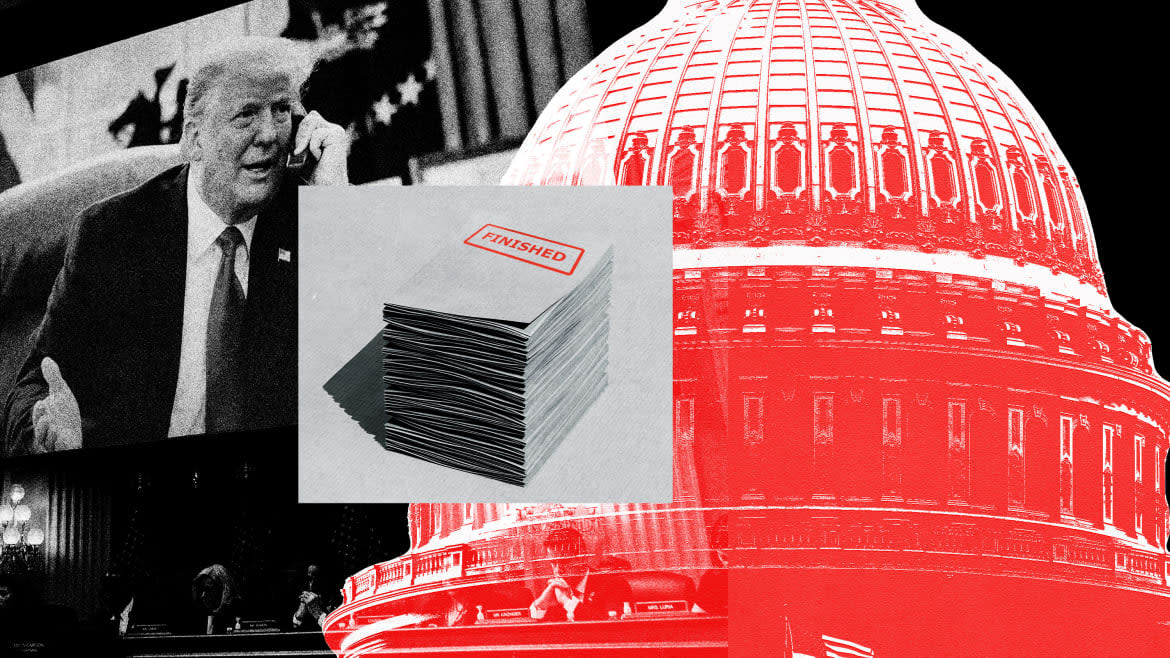Even the Jan. 6 Committee Knows Its Report Is Dead on Arrival

- Oops!Something went wrong.Please try again later.
- Oops!Something went wrong.Please try again later.
The House committee investigating the events of Jan. 6, 2021, is nearly done with its work. Witness interviews, including one on Monday with former Trump administration adviser Kellyanne Conway, are wrapping up.
Agreement on the “scope of the investigation” to be included in the final report is “very close” to being reached, committee member Rep. Adam Schiff (D-Calif.) said this week, and that document will soon be ready for the public to review. Before the year is out, Schiff declared, America will “have the evidence.”
Sure—but what will we do with it? Will anything come of these toils?
That was the essential question posed in a recent Harvard Gazette interview with Rep. Jamie Raskin (D-Md.), another committee member, which deserves attention beyond campus grounds.
Raskin was revealingly noncommittal in his replies, unwilling to make any prediction of concrete success. Insofar as he answered the Gazette’s questions at all—Raskin bounced between tacit acknowledgement and unconvincing denial of the futility of his committee’s work. It reads an awful lot like admission of defeat.
The Gazette’s story is a brief Q&A—five questions total—four of them focused narrowly on the investigation’s outcomes. First: Does Raskin believe Trump “committed any crimes and will the committee make any criminal referrals to the Department of Justice?”
The Unwelcome Return of Trump’s #Resistance Reply Guys
He “won’t comment on referrals,” but Trump’s criminality “seems unquestionable,” Raskin began, projecting agreement onto every other American. “I don’t think there’s anyone in the country who believes that any of this would have happened if Donald Trump had just accepted the results of the 2020 election,” he said.
Polling says otherwise. Per a Monmouth University survey published this fall, only 38 percent of Americans say Trump is “directly responsible for what happened on Jan. 6.” Another 25 percent give him partial responsibility—he “encouraged those involved”—while 33 percent “feel he has done nothing wrong.”
And insofar as the Jan. 6 committee can be credited with moving those numbers, Monmouth found, it moved them in Trump’s favor. Between June and September, as the committee televised its hearings, the “directly responsible” camp lost 4 points and the “nothing wrong” group gained three.
Next question: “Are any [accusations against Trump] prosecutable given the DOJ’s high bar for taking any action that involves presidents?” Raskin ignored the DOJ’s special standard for ex-presidents, pointing to run-of-the-mill rioters charged with “conspiracy to interfere with a federal proceeding” and implausibly suggesting Trump could be handled the same way.
“That crime seems tailor-made for precisely what Donald Trump did,” Raskin said. “I just don’t see how he escapes the jurisdiction of that criminal statute,” he added, a strange lack of imagination from a lawmaker who sat on this of all committees. Read closely, this isn’t quite a prediction of prosecution, though perhaps it’s intended to seem that way in uncareful eyes. Rather, it’s groundwork for Raskin to be shocked—shocked when no charges are brought.
Turning to the report itself, Raskin swung back to denial of the reality of the American public. “I strongly believe people will read this report,” he said. “I think people will see that this will not be the kind of report that sits on somebody’s shelf.” It will have new details, after all, not to mention a “multimedia presentation”!
Yet if previous reports on Trump’s alleged malfeasance are any indication, not only will the average American NEVER read the report, but neither will the average member of Congress. The net balance of minds changed by this document will probably be in the single digits. This too is something Raskin must know—and that knowledge would explain how hollow his protests ring.
Lastly, the Gazette wonders, how likely is it that a divided Congress will move any of the report’s proposed legislation along? The House is done for the year on Dec. 15. There simply isn’t time to implement committee ideas before the GOP majority takes over in January and dumps those plans in the garbage.
Here, at last, Raskin comes close to open admission of failure. “There are certainly a number of members” who’d like to change the Electoral College, he noted, but they won’t have anywhere near the votes for reforms that would likely require a constitutional amendment. Instead of passing legislation, then, House Democrats can “contemplate recommendations,” Raskin said. They can “talk about measures” and “try to address” problems on social media. Which is to say—They can do nothing.
Trump’s Political Future Hinges on How, Exactly, GOP Voters Want to Own the Libs
This defeat was predictable, and I’m not suggesting it means the committee investigation was pointless. The inquiry has value in its own right. The information is worth having even if it produces few to no legal or political consequences in the near term.
Still, the fruitlessness of this committee is increasingly evident. The final report is yet to come, but by now it should be clear, if it weren’t already, that this is not—as so many prior probes were not—The End of Trump.
It won’t transfigure American politics. It won’t produce a party realignment. It won’t meaningfully change how our elections are run. What it will do is give Democrats (and what few anti-Trump Republicans they didn’t manage to unseat) some new talking points. We’d be naïve to hope for anything more.
Get the Daily Beast's biggest scoops and scandals delivered right to your inbox. Sign up now.
Stay informed and gain unlimited access to the Daily Beast's unmatched reporting. Subscribe now.

